- Home
- Jeff Mariotte
Blood Quantum Page 13
Blood Quantum Read online
Page 13
"… thing is, it was the white people, the ones in the nineteenth and early twentieth century who were making policy at the Bureau of Indian Affairs – Bureau of Extinction Affairs, I call it – who were determined to hold us down. They couldn't destroy us militarily, but they could make us wish they had."
"Do you really think that, Herbert?" an off-screen voice asked.
"That's Torres," Archie whispered. "He's on the screen later."
"Hell yes!" Acosta jabbed at the camera with the lit cigarette. "Just look at the evidence, little cousin. It's everywhere. See, fetal alcohol syndrome? The health-care system they devised encourages that. It's easier to keep a population compliant if the individuals in it are damaged from birth. And even those who weren't damaged are then so occupied with taking care of the little ones that they're easy to push around, too." He stopped long enough to take a drag and blow out a plume of smoke, then the shot switched to a close-up of his hand, burning cigarette between his fingers. Age spots marked the back of his hand, and the webbing between the second and third knuckles was yellowed by nicotine.
"It's all about finding legal ways to keep us poor, keep us dependent, keep us like children they can manipulate. Fetal alcohol is one. Controlling our jobs is another, keeping them limited and low-paying. And casinos, don't get me started on them. They're a great way to legally steal money from the poor."
"But some of the profits go back to the tribe, right?" Torres asked
Another cut, back to the original framing. Acosta sucked on the cigarette, the tip glowing so brightly it seemed it would burn a hole through the screen. "Key word is 'some,' brother. As little as they can manage. And I'm not just talking about the Great White Father now, I'm talking about Indians, too. People like Chairman Domingo, who cut and cut the tribal rolls so they can concentrate the wealth in the hands of the few. At the expense of the many, of course. Instead of rolling the profits into services that would benefit the people who need it most, they try to make themselves and their friends – the people who are already the richest – even more wealthy. Throwing their own brothers and sisters under the bus to line their fat wallets. You ask me, Domingo and his kind are no better than the whites who stuck us on these reservations in the first place. Keeping us there, keeping us down. Squashing us like bugs if we try to stand up. One of these days, he'll get his."
"I think I've seen enough for now," Ray said. Archie stopped the video. "Send the rest to my computer, and I'll look at it when I can. I have to make a phone call." He started out the door but stopped and swung around. "And thanks, Archie. That's good stuff."
Ray called Nick as he headed for his "office," a cramped space in the morgue that Doc Robbins had made generously available to him. It was small, but it suited him, and it was better than hauling all his gear around all day long.
"Stokes," Nick answered.
"How's it going out there. Nick?"
"Could be better. It's a bloodbath here. Ray. A bunch of people were shot, and I'm afraid that more might be on the way."
"Oh, no. Any fatalities?" Ray asked.
"Yes, some. Not everybody. That guy Meoqui Torres you mentioned is among the wounded. Shooting was a drive-by at his place."
"I'm sorry to hear that. Speaking of Torres, I just watched a clip from his new movie. It's pretty incendiary."
"That's kind of his reputation."
"If you can, check into a man named Herbert Acosta. He's Grey Rock, and I think he lives on the reservation. He made an implicit threat against Robert Domingo, on tape."
"Herbert Acosta, huh? I'll let Brass know. I'm working the shooting scene while he and our tribal police escort are running around."
"He got the easy part, huh? Okay, I'll finish up what I'm doing here, and then I'll head out your way to see if I can help. Watch your back. Nick."
"Always, Ray," Nick said. "Thanks."
*
Nick called Brass and told him what Ray had said about Herbert Acosta. He heard Brass relay the information to Aguirre, heard Aguirre chuckle without humor.
"Acosta?" the tribal cop said. "Tell him he's too late."
"What do you mean?"
"You see that older guy at Meoqui's? Skinny guy, gray hair?"
"The dead one."
"Yeah, the dead one. That was Herbert Acosta."
"You catch that, Nick?" Brass asked into the phone.
"Yeah, I got it. Paramedics just rolled up. I'll try to process Acosta before he's taken away, see if I can connect him to Domingo's house."
"You do that," Brass said. "I'll talk to you later."
16
"I'm certain, Detective Willows -"
"I'm not a detective, Doctor Boullet. I'm a criminalist. You can call me Supervisor Willows, or you can call me Catherine."
"Very well, Supervisor Willows," the doctor amended. Somewhat pointedly, Catherine thought. Hutch Boullet had a pinched face, with a pursed mouth, small eyes, and a high forehead. He looked as if he spent more time playing tennis than examining patients, but the dramatic view of the city's skyline from the window of his spacious office suggested that he had a profitable practice. Of course, with the Cameron family as patients, he might not need any others. "At any rate, you're a law-enforcement officer, so I'm sure you understand that I cannot release any information about my patients without their express consent. You're familiar with doctor-patient confidentiality, of course."
"I am, Doctor," Catherine assured him. She had come there on a hunch, and he had not been happy to carve out some time from his day to see her. She could have called first, but for all she knew, that might have sent him scurrying to the nearest tennis court. At least this way, she had caught him in the office. "And I wouldn't ask if it wasn't vitally important.''
"I don't care if the fate of the free world depends on it. I can't do it."
"Here's the thing," she said. She had to get through to this guy somehow, but so far, he had proven difficult to crack. "My DNA tech has made a positive match between some hairs and fluids found in Daria Cameron's condo and some other hairs and pieces of fingernail found inside a tent at a homeless encampment."
Boullet looked uncomfortable about the direction of the conversation. He was sitting behind his expensive wooden desk, his lips pursed, his gaze locked on the desktop as if afraid to look away. There was more color in his cheeks than there had been a moment ago. "That seems most unlikely. Are you sure there isn't some mistake at your lab? I understand there have been some issues of contamination -"
"Not in a very long while, Doctor. I can assure you, our lab is very clean. And while some forensic science is considered to be questionable, DNA isn't. It's as definitive as fingerprints."
"Very well," the doctor said. "Go on."
"The hairs and fingernails that were found are very brittle, and there are whitish striations in the nails. You'd know better than I what that means. The point is, Daria is missing. And we know from the household staff that she's not well. But if she's critically ill in some way, then that changes the whole dynamic. It increases the urgency of finding her, wouldn't you say?"
"Certainly, people are looking for her anyway," the doctor said. "I'm not sure what -"
"Of course they are," Catherine interrupted. "But there's looking and there's looking. She's young, she's not currently employed, there haven't been any signs of abduction or foul play. And she's well off, and this is Las Vegas. For all we know, she's missing because she took a penthouse suite at the Romanov, or she went to Europe for the month. But if she's in need of constant medical attention or if being away from treatment might result in her death, then it's a different story. Not only does it give us new places to search – hospitals, pharmacies, doctor's offices, and the like – but it changes the importance of finding her quickly. That information might free up more resources for the search."
"I see." The doctor sat there, steepling his fingers. Catherine let the silence build. Keeping the pressure on him. If he truly had his patient's best interests at heart, h
e would have to make the right decision. "All right. I don't like to do this, because it's a violation of the first rule of patients' rights. And I'll trust you to keep this information as closely held as possible – it would be very bad if it became public. But if it's a matter of her life and death, I suppose I really have no choice."
Jackpot, Catherine thought. Not wanting to spook him into changing his mind, she didn't allow her triumph to show on her face. "That's right."
"Daria is quite seriously ill. I'm afraid I still haven't been able to diagnose her condition adequately; it has only presented itself recently. She has what appears to be congestion in her heart and a bit of an orange-brown discoloration of her skin, which is getting progressively more pronounced. For her heart, I've prescribed digitalis and aspirin for the time being, and I intended to schedule her for a battery of diagnostic tests, but there were… obstacles, and then she stopped returning our calls. On one of my visits to the estate, I checked with her mother, who told me she had gone missing."
"Can you tell me what those obstacles were?"
"Scheduling conflicts, I was led to believe.'
"You don't sound convinced."
"Let's just say that if it were me, I would put the rest of my life on hold until I found out. But there seem to be other factors at work here, other people making decisions for her. Beyond that, I'd rather not go into detail."
Catherine let it go. "So she'll need access to a pharmacy to keep getting the digitalis," she said. "And the skin condition will be something our officers can watch for. That's a big help."
"The family has an adequate supply of medication, at least for the time being. But at some point, yes, she'll need to get more. And I hope this helps her, honestly." He was staring at his desk again, looking stricken. "I take my responsibilities seriously, Supervisor Willows. You presented a quandary, with two competing and mutually exclusive priorities. I hope I chose correctly."
"I'm sure you did, Doctor Boullet," Catherine said. "Thank you for your help."
She was standing up when something he had said struck her. He said he talked to Helena Cameron on one of his visits to the house and that the family had plenty of medicine. Did that mean Helena was suffering from the same thing? She hadn't seen the woman when she had gone to the house – she wasn't well, either, and she had gone to bed, tranquilized, the estate manager had said.
Dustin Goitlieb, in fact, the same estate manager who had sex with Daria before her disappearance.
He would need talking to again.
She started to ask the doctor about Helena, then stopped herself. He had told her everything he was going to and wouldn't talk about Helena, she was sure, without her permission, since she wasn't missing. He had noticed her hesitation, though. "Yes?" he asked. "Will there be something else. Supervisor Willows?"
"No, Doctor. That's quite enough. Thank you again."
*
She called Wendy from the car. "Thanks for that quick work on the Daria Cameron DNA," she said. "It was exactly what I needed to pry some information out of her doctor."
Wendy didn't ask what information, and Catherine appreciated that. "Glad it was helpful," she said. "I was just about to call you again."
"You've got something else for me? You're on a tear today."
"I just want to get everything wrapped up so I can go home."
"Well, you've been a big help today. We all would like to call it quits, but -"
Wendy cut her off. "I know, Catherine. I wasn't really complaining. Much. Anyway, here's the scoop…"
*
Catherine knew she was risking Undersheriff Ecklie's wrath by returning to the scene of the crime – the Cameron estate, in this case. She was doubling her jeopardy by demanding to talk to Helena Cameron herself. But after she made her case to Dustin Gottlieb (all the while promising herself she would have a few words with him before she left the premises), he parked her in a sitting room and went to fetch Mrs. Cameron, Drake McCann, and Craig Stilton.
During the few minutes she was waiting there alone, Catherine took in the artwork on the walls – an original Thomas Moran Yellowstone landscape, which was almost as big as one of Catherine's entire walls, a pastoral piece by John Singer Sargent, and more. Many paintings appeared to be at least a hundred years old, most depicting somewhat romanticized landscapes. All were hung in frames that appeared just as old as the paintings themselves.
"I love the out-of-doors," Helena Cameron said in a voice quavering with age and ill health. Catherine was staring at the Yellowstone painting, depicting a brilliant sunset over the mountains, and hadn't heard her come in. "Sadly, I hardly get to see it in person anymore. Bix and I used to travel the West in a style that might surprise you, to look at me now, Mrs. Willows. We drove around in a station wagon with wooden panels on the sides, slept in tents, cooked our meals on campfires. Even after the money was coming in and the children were born, we loved to be outside, in nature. Now I can only experience what little nature there is here on the estate or enjoy it through lovely paintings and photographs."
"I sympathize, Mrs. Cameron," Catherine said. "I've always been more of an indoor girl myself, but I do appreciate natural beauty when I get the chance to see it."
"To what do we owe this visit, Supervisor Willows?" Stilton asked, remembering the right title for her. He and McCann flanked the lady of the house, as if ready to catch her if she fell. Helena Cameron was barely five feet tall and girlishly petite, with white hair cropped boyishly short and skin that looked a few shades past tan. "Is there some development in the case?"
"There are two cases ongoing," Catherine said. "The man who was shot on the property last night and Daria's disappearance. I'm becoming more and more convinced that there's a connection between the two."
"Oh, I don't see how there could be," Helena scoffed. "I'm told the man was a filthy bum, perhaps some sort of degenerate -"
"Careful how you talk about him, Mrs. Cameron," Catherine said, interrupting as gently as she could. She didn't want to let Helena become too riled up, since she was clearly not well. But she was here, and the poor woman had to know the truth. Next of kin notification could be the hardest job any police officer had to do. Sometimes, though, valuable information could be learned through the process, which was one of the reasons detectives preferred to do it themselves instead of delegating it. "In fact, it might be best if you sat down."
"Anything you have to say, Mrs. Willows, I can hear standing up."
"Very well," Catherine said. She noted that Craig Stilton took Helena's elbow, offering support. Catherine took a deep breath. Conrad Ecklie would be pissed, but that was a risk she would have to run. "The man Mr. McCann here shot last night? He was Troy Cameron, your son. I'm very sorry for your loss."
Helena wobbled, and McCann caught her other arm. Her face went white, or as white as someone whose skin was taking on a distinct terra-cotta cast could go, and her dainty, fragile left hand curled before her lips. "That's not possible."
"This is outrageous," Stilton fumed. "How can you come in here and say something like that? What proof do you have?"
"I have enough common DNA markers to be sure, at odds of about eight trillion to one," Catherine said.
Helena's legs threatened to give out. Stilton and McCann got her onto a couch that didn't look as if it would have been comfortable when some French craftsman had made it in the 1700s, much less today. "He… I haven't seen Troy since he was seventeen," she said in a faltering voice. "I can't believe he's been… alive all this time, and… and now that I find him, he's… he's…"
Her head drifted backward. Stilton got a hand behind it just before it hit the wooden rail at the back of the couch. "We need to get her to bed," he said. "She can't take this. I can't believe you came in here and told her that."
"She has a right to know," Catherine said. "We always tell the next of kin." She knew that Ecklie would hear about it, and she would hear about it from him. But what she had said was true. Helena Cameron had to be told
. Better in person than through an intermediary. And Catherine had needed to see her reaction, if at all possible.
One thing was certain now: Helena had not known her son was still alive.
And another thing: whatever illness Daria Cameron suffered from, Helena had it, too. Her flesh was definitely on the orange side, and when she had put her hand to her mouth, Catherine had seen yellowish-white streaks on her nails.
"I'm afraid you'll have to leave, Supervisor Willows," Gottlieb said as he marched into the sitting room. "I understand you've upset Mrs. Cameron terribly."
"That was not my intention," Catherine said. "But I'm sure you'll agree that a mother has a right to know her only son has been found."
"There was surely a better way to tell her."
"Perhaps. I believe in the direct, honest approach myself. Unlike some people."
Gottlieb crossed his arms over his chest, perhaps unintentionally swelling his biceps. "What does that mean?"
"It means," Catherine said, "that you didn't tell investigating officers about your relationship with Daria Cameron. She's missing, and her family is concerned. Don't you think your relationship is something the police might want to know about? Or were you afraid that it would make you a suspect?" She knew she was pushing it, maybe going a little over the top. But her certainty that this guy would complain to Ecklie, combined with his lame attempt to intimidate her by showing off his muscles, had licked her off.
To her utter surprise, Goltlieb backed down, deflating in an almost physical way. "Okay," he said. "You're right. Daria and I were seeing each other. But you have to understand that we agreed to keep it a secret because she was afraid it might disturb her mother, and I was worried that it might affect my relationships with the other people here at work. There was nothing more sinister about it than that. I didn't say anything to the police because I didn't think it mattered. I knew that nothing I had done had anything to do with Daria's disappearance, so if they spent time investigating me, it would just distract them from what was really important."

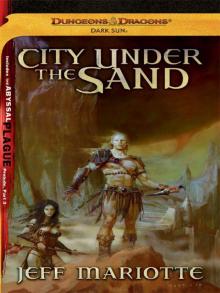 City Under the Sand
City Under the Sand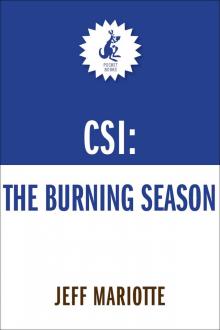 The Burning Season
The Burning Season Sanctuary
Sanctuary Winds of the Wild Sea
Winds of the Wild Sea Serpents in the Garden
Serpents in the Garden Close to the Ground
Close to the Ground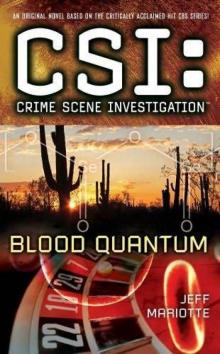 Blood Quantum
Blood Quantum Brass in Pocket
Brass in Pocket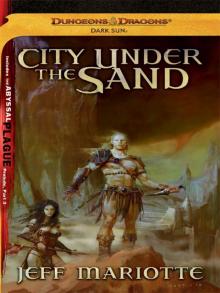 City Under the Sand: A Dark Sun Novel (Dungeons & Dragons: Dark Sun)
City Under the Sand: A Dark Sun Novel (Dungeons & Dragons: Dark Sun)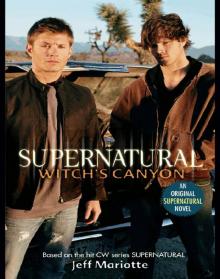 Witch's Canyon
Witch's Canyon STAR TREK: The Lost Era - 2355-2357 - Deny Thy Father
STAR TREK: The Lost Era - 2355-2357 - Deny Thy Father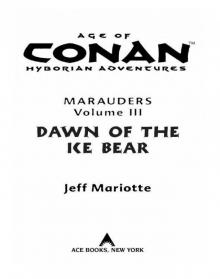 Dawn of the Ice Bear
Dawn of the Ice Bear The Xander Years, Vol.2
The Xander Years, Vol.2 Ghost of the Wall
Ghost of the Wall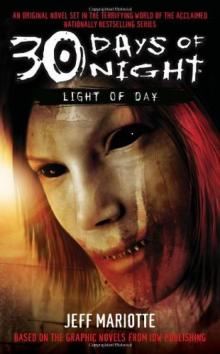 30 Days of Night: Light of Day
30 Days of Night: Light of Day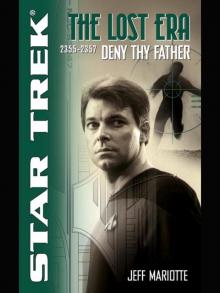 Deny Thy Father
Deny Thy Father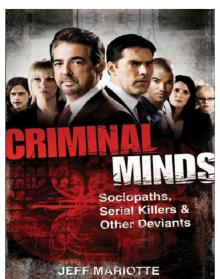 Criminal Minds
Criminal Minds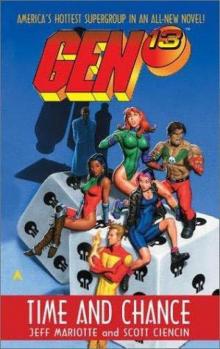 Time and Chance
Time and Chance The Folded World
The Folded World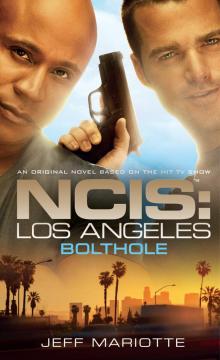 Bolthole
Bolthole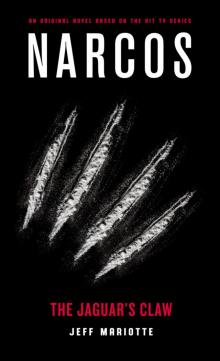 Narcos
Narcos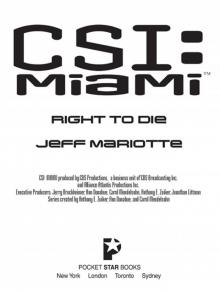 Right to Die
Right to Die